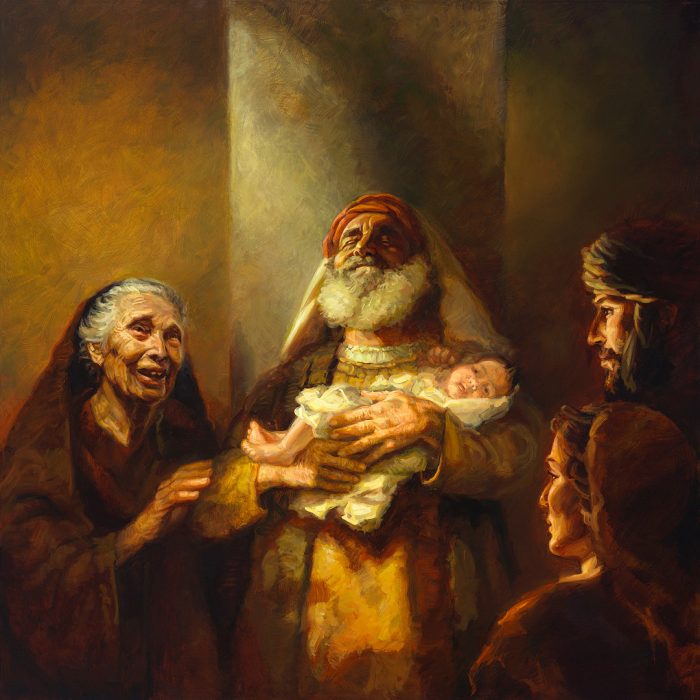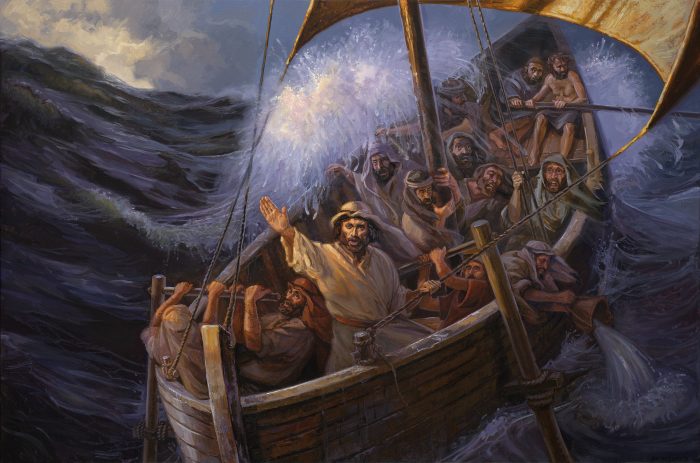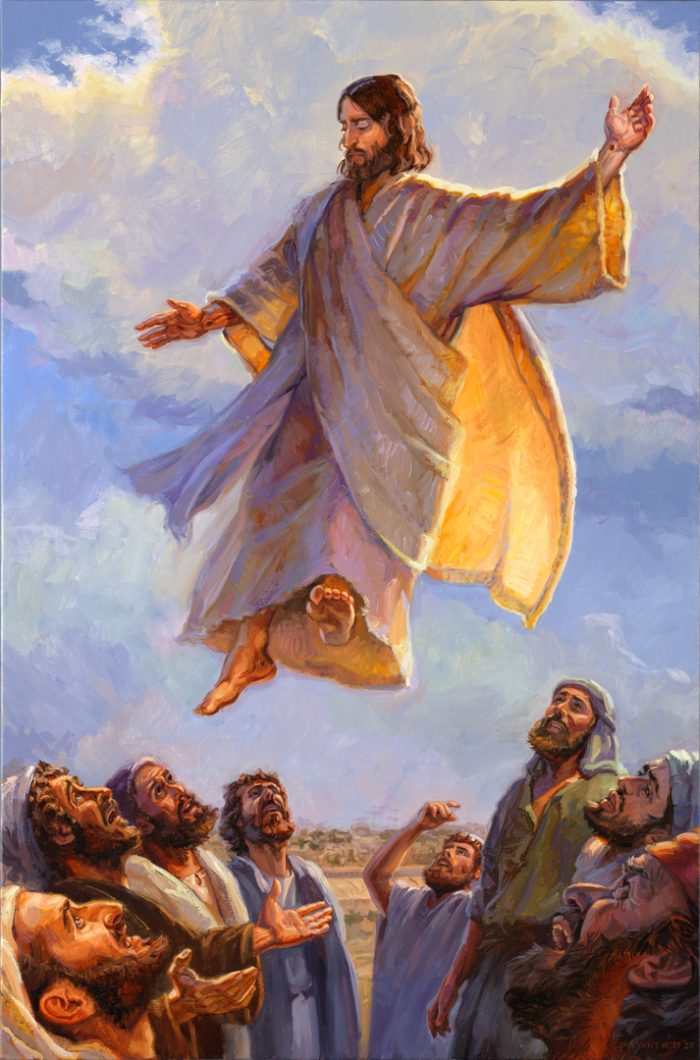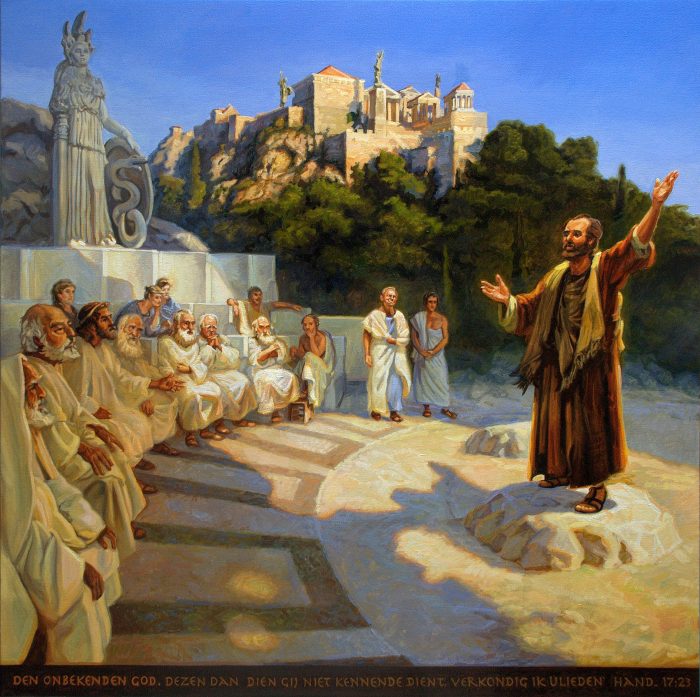Probably everyone has a certain image of the books of the New Testament. For a long time, mine was rather fragmented; like a succession of bits of Bible text. Many sections are beautiful, but plenty of others are difficult or even incomprehensible. But it helps when you put on glasses through which you suddenly begin to see coherence and order. This little blog is meant to give you such glasses, in the hope that it will help you read and understand the New Testament.
This blog is sort of a continuation of the previous, where I could not avoid some repetition here and there.
The entire New Testament is about Christ
Actually, the whole New Testament from beginning to end is about the Lord Jesus Christ.
- The gospels are all about Jesus Christ, the Son of God. From His incarnation to His ascension.
- In Acts, the gospel is proclaimed and the "church" - the congregation - of Christ comes into being. That church here on earth is also referred to as the "Body of Christ" that is here on earth while the Head - Christ Himself - is glorified in heaven, at the right hand of God.
- The epistles contain teaching about Christ and the church and the things that threaten the church - that is the believers. Teaching needed to stand firm in the faith until the end.
- The book of Revelation is about the revelation - the appearance, the visible return - of Jesus Christ with the church to establish His kingdom here on earth.
The Gospels
The Gospels describe the incarnation of the Son of God. His whole life and especially the last three years of His public appearance are the subject the evangelists wrote about. Finally, of course, His death on Golgotha and the run-up to it, as well as then the burial, resurrection and His ascension.
One of the spectacles of reading the gospels is that they all have a slightly different point of view and present the Lord Jesus differently:
Matthew: the king of the Jews
Marc: the servant of God
Luke: the son of man
John: the Son of God
Read these accounts and come away impressed with Who He was: the Word who became flesh and dwelt among us human beings. He is the One promised by God from the beginning as the Savior.
In everything He has shown that He is truly God. And in the three hours of darkness, He took all sin upon Himself and made reconciliation.




The four evangelists show us the glory of Christ, and what they describe is only part of what He did. If everything He did were described then, according to John, "the world itself could not comprehend the written books" (John 21:25). But what is written down is for the purpose "that you may believe that Jesus is the Christ, the Son of God, and that by believing you may have life in His name" (John 20:31). Perhaps we may apply this statement from John to the whole of the four Gospels.
the gospels were written that we might believe
"... that jesus is christ, the son of god, and that by believing you may have life in his name."
- john 20:31 -
There are some very special chapters in the Gospel of John (14 through 17) that all have to do with the time when the Lord Jesus would no longer be with His disciples. It is full of encouragement and comfort for those who would be left behind when He would return to His heavenly Father.
On the glory of Christ and the unity of believers
In the 17th chapter contains the Lord Jesus' prayer to His Father in which He looks ahead to the time when He would no longer be with them. He prays to His Father then for His disciples - and for us! - that they and we may be preserved in the hostile world. The purpose of His prayer is the unity of believers, as He says in the following verses:
"And I pray not only for these, but also for those who will believe in Me through their word, that they all may be one, as You, Father, in Me, and I in You, that they also may be one in Us, that the world may believe that You have sent Me. And I have given them the glory which You have given Me, that they may be one, As We are One; I in them, and You in Me, that they may be perfectly one and that the world may recognize that You have sent Me and have loved them as You have loved Me." (John 17:20-23).
The only means of showing that unity as well is what Christ has given us: His glory. For this is how He puts it, "I have given them the glory which You have given Me, that they may be one. A Christian community where the believers are not above all personally and together concerned with Jesus Christ and His glory is not a Christian community. Christ's glory is the focal point that makes and sustains unity.
Christ's glory is the only thing that
the unity of the faithful
establishes and sustains.
When we ask ourselves what is actually meant by this glory, it cannot but be about the person of the Lord Jesus Christ. About who He is, what He has done and brought about, what He is doing now in heaven and what will soon be visible of Him. He will soon be the center of the Father's house, but also of the new heaven and earth. And now He is already the center of believers here on earth. This is also how He told His disciples, "For where two or three are gathered in My Name, there am I in their midst. (Matthew 18:20).
Even in the Old Testament, it is true that the Name of the Lord was the highest unifying element - so to speak - of the people of Israel, to which the Lord God attached His blessing (see, for example, Exodus 20:24). The Name of the Lord was of central importance to the people and it separated them from all other nations. For the Name of the Lord, Solomon had to build a house so that He could dwell in the midst of His people (e.g., 1 Kings 5:5).
In John 17, the Lord Jesus prays the Father for the safekeeping of the disciples, His church, when He would no longer be with them. He Himself gives them His glory, as we have seen. But He also says, both at the beginning and at the end of His prayer (verses 6 and 26) that He has made known to His own the Name of God the Father. He is the Father's sent one, and He has proclaimed Who God the Father is in His walk here on earth and in His work on the cross. Exactly as He already said it prophetically in Psalm 22:23: "I will tell Your Name my brethren, in the midst of the congregation I will praise You."
The bottom line is that knowing the one true God, the Father and Jesus Christ, whom He sent, is the only thing that brings and keeps believers together. It is the preservation in His Name (John 17:11,12) and the glory of Christ that works and preserves unity.
The Acts of the Apostles
Written by the evangelist Luke, the book of Acts describes the birth and growth of what has been called the Christian 'church'.
The birth of the first church is reported in Acts 2 (verses 37-47). Three thousand people in one day, after which the Lord added others each day "who were saved. Because that was what it was all about: people converted, believed in the Lord Jesus, knew that their sins were forgiven and that they would receive eternal salvation. And all on the basis of the work Christ accomplished on the cross.
The account speaks of a congregation of people who were different in life than before. Faith brought them great joy and praise for God and made them look out for one another while remaining simple in heart.




The Gospel of Jesus Christ is spread among the Jews and the Gentiles - that is, the non-Jews. The first part of the book mainly describes the proclamation among the Jews and the second part describes Paul's proclamation among the Gentiles.
The fact that Gentiles also converted and came to believe in Jesus Christ raised the question of how these two groups - believers from the Jews and from the Gentiles/pagans - could form a common "church. A decision was made about this in a meeting in Jerusalem (Acts 15). The letter sent to Antioch about this contains the following things:
- Believers from the Gentiles were not to be required to be circumcised or to keep the law of Moses.
- But they had to keep far away from their old pagan life. This involved three, what I'll call "areas of life" in which everything would have to change: a. everything related to idolatry, b. all illicit sexuality and c. their pagan lifestyle.
Both Jewish and pagan influences would threaten the continuity of Christian congregations. (See also here).
That these threats were real is evident from the letters of the apostles who warned against them in every tone. By accepting or allowing these influences, the glory of the Gospel of Christ would begin to lose its luster for them. Their relationship with the Lord Jesus - both personal and communal - could lose them.
Two examples:
- to the Corinthians, Paul says that they don't mind if someone preaches to them "another Jesus" or "another Gospel" (2 Corinthians 11:4).
- to the Galatians, the apostle says that "Christ will be of no use to them" and that they have "become detached from Christ" (Galatians 5:2-4)
The letters of the apostles
In the New Testament letters we find all of the above. Both the glory of Christ, and also all that was established in Jerusalem. It is extraordinary to see how the Spirit of God inspired these men to send letters to congregations and individuals and that they always dealt with one or more of the things that were established in Jerusalem, but almost never without also describing the glory of the Lord Jesus Christ. In doing so, each letter was different: a different perspective and different aspects and different leads or difficulties on the part of the addressee(s).




So a broad palette of letters, yet repeatedly dealing with the same topics:
- The Gospel of God and the glory of Jesus Christ are emphasized throughout, often illuminated from different points of view. Believers are exhorted to hold fast to the Gospel and Christ.
- In this we are appalled to be told about "the things that are above. They are the things we need to keep and nourish our faith; they are the spiritual things, the eternal things. They are about the love of God and of Christ, about the work at Calvary and its significance. About Christ who is at the right hand of God, Who prays for us and is our advocate. Our high priest in heaven, the throne of grace from Whom we receive mercy and grace for our walk here below. About our fellowship with Him and with God the Father. Remember further what is written about the love of God and the love of Christ and about the changing work of God's Spirit in believers.
But attention is also given to things to come such as the resurrection, the rapture of the church, as well as the appearance of our Lord Jesus Christ and the things that precede it.
- In this we are appalled to be told about "the things that are above. They are the things we need to keep and nourish our faith; they are the spiritual things, the eternal things. They are about the love of God and of Christ, about the work at Calvary and its significance. About Christ who is at the right hand of God, Who prays for us and is our advocate. Our high priest in heaven, the throne of grace from Whom we receive mercy and grace for our walk here below. About our fellowship with Him and with God the Father. Remember further what is written about the love of God and the love of Christ and about the changing work of God's Spirit in believers.
All these things belong to
"the glory" of the Lord Jesus Christ,
which He has given to His church to be united.
- Invariably, it also describes what attitudes and behaviors are appropriate for one who belongs to the Lord Jesus. Our relationships within marriage and family, within the circle of believers and with the world around us. We belong to the glorified Lord in heaven who is rejected here on earth, and the latter will also be evident in our lives. We belong to a rejected Lord and show in our lives that we too do not belong here on earth.
- The threats to our faith
- First, legalism as a threat to the unity of the Christian congregation. Rules and rituals create divisions among believers. If you disagree with them, have a different view of something, you do not belong. This principle is also the basis of different denominations. Different views of the Bible and different explanations automatically lead to this. As an example, think about baptism or the sacrament; these are just a few obvious examples, but in practice the number of views that separate does seem to be infinite.
Moreover, accepting rules or rituals as distinctive from other believers stifles personal faith and personal dealings with the Lord and with Scripture. At least on the themes accepted as characteristic of the group. Because thinking about these again with an open Bible hardly ever happens. And it is also very dangerous, because imagine that you come to different views: how to proceed then?
In short this kind of thinking is not only legalistic, but it is also sectarian.
- First, legalism as a threat to the unity of the Christian congregation. Rules and rituals create divisions among believers. If you disagree with them, have a different view of something, you do not belong. This principle is also the basis of different denominations. Different views of the Bible and different explanations automatically lead to this. As an example, think about baptism or the sacrament; these are just a few obvious examples, but in practice the number of views that separate does seem to be infinite.
- Threats that come to believers from the world - paganism - must be discerned and avoided. There are three areas of life mentioned in Acts 15:
- First, the relationship with the invisible world. The pagan world also has a relationship with the invisible world, not with God, but with the demons. The great commandment in the Bible is that we should not approach our God in the same way as the pagans. Therefore, we are called to avoid everything that has to do with idolatry.
If "the just shall live by faith," then we must not mix our faith life with outward, observable things. To the extent that the Christian relies on things you can experience [experience, perceive, feel] his faith diminishes and the risk becomes great that he will eventually be deceived and fall into idolatry. Seeking "experiences of God" kills spiritual life in the Christian congregation. Christ the Crucified is no longer the central center of the community of faith. Moreover, it deprives the congregation of a living expectation of the future.
This is why we find warnings against idolatry in almost all the epistles - to a greater or lesser extent. Sometimes very clear and explicit, but sometimes a little hidden by a few characteristic words. - Second, sexual relationships between people. Pagan/worldly views of sexuality in a broad sense are a direct threat to the Christian church because they are contrary to the biblical norm. Throughout the Bible, sexuality has a place within the lifelong marriage of a man and a woman. It has been that way from the beginning (Matthew 19:8). Any deviations from that - and there are quite a few today - have no place in the lives of believers.
But the world has very different ideas about marriage, divorce, remarriage, homosexuality and so on and so forth. These are views and practices that are anti-biblical and we are called to stay far from them.
Hence, the letters constantly warn against it. - Third, there is another domain that deals with yourself - how you view yourself and how you are in life. I suspect something like this is meant by "the choked and the blood" mentioned in Acts 15 (see also here). People without God live for themselves; ultimately, they themselves are the most important thing. After all, you only live once, so get out what's in it. Carpe Diem, seize the day.
But these pagan/worldly views of life are a threat to the faith and lifestyle appropriate to the Gospel. A worldly lifestyle does not belong to the Christian who claims to belong to a rejected Christ. We are unfortunately easily sucked into it.
Moreover, I think that in the worldly lifestyle also fits how one thinks about man, life and death. These are subjects in which God plays no role whatsoever and where people feel that man can take all that into his own hands. What one is tinkering with DNA of humans and animals seems to me to go far beyond the limits set by God. And what about the so-called "completed life"? These are views that are increasingly anti-Christian and we should stay far from them.
- First, the relationship with the invisible world. The pagan world also has a relationship with the invisible world, not with God, but with the demons. The great commandment in the Bible is that we should not approach our God in the same way as the pagans. Therefore, we are called to avoid everything that has to do with idolatry.
Each letter is different and it is useful to try to figure out these different issues. As far as I can tell, there is usually some connection between
- On the one hand, the threats specifically mentioned
- and that which is taught about the Lord Jesus Christ, about God our Father and/or about the Holy Spirit.
Keep in mind that the recipient or receiving congregation usually only received this letter. This means that you can expect a letter to explain itself in general terms. That is why, in my opinion, we should primarily look for the connections in the letter itself, or also between several letters to the same recipient.
What all the recipients probably also had in common is that they all knew the Old Testament. Thus, they could understand what the letter's references to the Old Testament contained.
From Romans to Jude
The contrast between the first and last epistles in the New Testament is remarkable.

The first letter - to the believers in Rome - comprehensively and almost exclusively describes the whole Gospel of God. There is no writing about abuses that would exist among the believers that needed to be corrected. It is the basic course of faith so to speak. Only at the end (Romans 16:17-18) is there a warning against people who "interpret" the Gospel "somewhat differently" from what the apostles taught.
In contrast, the last letter - that of Jude - explicitly does not speak of the Gospel ("the common salvation"), but rather 100% focuses on the struggle for the faith and against the errorists who will be there in the last age.
Between these two letters are all the others. They are listed below with a brief explanation for each letter. It is a first attempt [1] to show that the letters
- to present, on the one hand, the glory of the Gospel and of the person of Christ and to encourage the believer to remain attached to Him. This also means Christ as the object for our hearts and the highest good in our lives.
- on the other hand expose the things that threaten the Christian life (both inner and outer). They are rituals and beliefs/teachings from the believers' Jewish or pagan background that they take with them or can easily fall back into.
| Letter | Comments |
|---|---|
| Romans | The Gospel of God is explained here from A to Z. Including the work of the Spirit of God in the Christian life. But also about Israel in chapters 9-11. The practice of the Christian life in chapters 12-15. At the end the warning (16:17) how to deal with those who deviate from the apostles' teaching. ## The grace of our Lord Jesus Christ be with you all. Amen. (16:24) |
| 1 Corinthians | Teaching about influences of idolatry and adoption of such practices. It was believed that the manifestations they experienced were from God. Chapter 8-11. "Concerning idol sacrifices . The possibility of Christians putting themselves under demonic influence: "I do not want you to have fellowship with demons." (10:20) On spiritual (things) - teaching on what is truly spiritual. Chapter 12-15. "Now concerning the spiritual ..." Teaching on what is and is not spiritual in the church. These two topics are part of the basic knowledge for today's congregations. Further, many pointers to the Christian life, often against the background of pagan life. For example, marriage and sexuality. ## The grace of the Lord Jesus Christ be with you (16:23). |
| 2 Corinthians | Teaching about Paul's service to those in Corinth who thought they were as important as he was. Paul calls them "false apostles, deceitful workers ..." (11:13); they disguised themselves as "apostles" in imitation of Satan disguising himself as "an angel of light" (11:14). The church had accepted their teaching just as the serpent tempted Eve (11:3). Another Jesus, another spirit and another Gospel were things they readily accepted and apparently could no longer discern. When idolatry was not to be judged, the "faithful" were to leave the congregation (6:14-18), cleansing themselves "from all defilement of flesh and spirit and accomplishing sanctification in the fear of God" (7:1). These are instructions for those in such a fellowship. ## The grace of the Lord Jesus Christ, the love of God and the fellowship of the Holy Spirit be with you all. Amen. (13:13) |
| Galatians | The Gospel is emphasized and also how Paul received it from God Himself. The Galatians also - like the Corinthians - were easily persuaded to follow another gospel (1:8-9). Paul resisted that other gospel in which they had to follow certain rules to be "better Christians. But a Christian lives by faith alone (2:16-20). Paul again extensively emphasizes the work of Christ and what it means to be justified by faith. Faith alone in Christ is necessary to become a child of God. It is a great plea to live by faith alone and let go of all legalism. Not living for the flesh, but walking by the Spirit (5:13ff.) "If we live by the Spirit, then also walk by the Spirit" (5:25) is the motto. If we do not, then "we become detached from Christ" (5:4). ## The grace of our Lord Jesus Christ be with your spirit, brethren! Amen. (6:18) |
| Ephesians | Believers are joined to their Lord who is in heaven. With Him we are united in His death and resurrection. The church is meant to be "to the praise of God's glory" for all eternity. Therefore, the church - the collective believers - is already commissioned to "make known to the principalities and powers in the heavenly places the manifold wisdom of God." (3:10). This is only possible if "Christ dwells in our hearts by faith" (3:17ff.) and in all relationships believers show submission (e.g., 5:21). But then you can be sure that the devil will unleash his crafty temptations on us and we will have a spiritual battle to fight (6:11-13). ## Grace be with all who love our Lord Jesus Christ in imperishability. Amen. (6:24) |
| Philippians | Christ and His mind are presented to us. How He humbled Himself, but also how soon every knee will bow before Him to the glory of God the Father (2:5-11). A call to walk in accordance with the Gospel (1:27). "Winning Christ," that is "knowing Him and the power of His resurrection and the fellowship of His sufferings" (3:8,10). A life focused on and connected to heaven (3:20). The key to this, however, is that we continually "rejoice in the Lord" (2:17,18; 3:1; 4:4). Furthermore, we must be watchful of those who mutilate the Gospel; they are called dogs and bad workers (3:2). ## The grace of our Lord Jesus Christ be with you (4:23). |
| Colossians | The believers in Colossae were threatened by errors of the Essenes. This was an esoteric (spiritual-mystical) movement with characteristics that we also find in contemplation (see, for example here). They saw the Lord Jesus as a man who had become divine by his way of life and thus "lived close to God. A kind of super-guru. But Christ is entirely different and therefore the Lord Jesus is spoken of in very exalted terms. He is the Son of God's love (1:13), Image of the invisible God and the Firstborn of all creation (1:15). He is the One who would be First in all things and through Whom all things are reconciled to God. The challenge is not to live according to the fundamentals of the world (2:8,20). We conceive the things that are above (3:2) and have clothed ourselves with the new man (3:10), so that it is visible that we serve the Lord (3:24). ## Grace be with you. Amen. (4:18) |
| 1 Thessalonians | The believers in Thessalonica had converted from idols to God. They accepted the Gospel of God with joy, but it also brought them tribulation from the beginning. Probably they were "serious" idolaters - see Acts 17:4 "God-fearing Greeks. Paul's teaching in the letter takes on additional color against the background of idolatrous practices and teachings - see, for example, 4:1-8 and 5:4-11. Furthermore, Paul taught about the resurrection of the dead in Christ and the Lord's return (4:13-18). ## The grace of our Lord Jesus Christ be with you. Amen. (5:28) |
| 2 Thessalonians | The believers in Thessalonica are encouraged to persevere in the tribulation because it will be put right at the revelation of the Lord Jesus from the heavens (1:3-12). The tribulation was so severe that they doubted that the rapture of the church might have already taken place. Paul therefore explains by what they can recognize that they have not missed the rapture (2:1-12). They may be sure that they will therefore not miss the glory of the Lord Jesus Christ (2:13-16). Furthermore, a Christian is supposed to walk regularly and work for his livelihood (3:6-15). ## The grace of our Lord Jesus Christ be with you all. Amen. (3:18) |
| 1 Timothy | Remarkably, the letter warns against "teachers of the law" (1:4-11) but also against those who promote contemplation (4:1-5). It is the apostasy of faith that will occur in later times. Paul exhorts Timothy to teach the sound doctrine of the gospel and a godly life. It is the good fight every believer must fight to keep the faith (1:18,19). Also, Paul describes what behavior a believer should exhibit, men and women in the church (2:8-15; 3:1-16), the believing woman and her virtues in the face of a worldly image (5:1-16). Family members should also care for one another. Servants (6:1-2) regarding money and wealth (6:3-10; 6:17-19). Also see here and here). ## Grace be with you. Amen. (6:21) |
| 2 Timothy | The apostle Paul's last letter he writes to Timothy. "I have fought the good fight. I have brought the course to an end. I have kept the faith" (4:7). It is a message to persevere in faith and work for the Lord. With errorists he should not argue. The Lord knows who is His and who is not (2:19). When Christians resist you may teach them with gentleness, that God may grant them repentance (2:24-16). Times are coming that are dangerous because of the occultism invading Christian communities: "hard times" (3:1-9; 4:3-4). ## Grace be with you. Amen. (4:22) |
| Titus | Apparently influenced by Jewish mysticism and human commandments (1:10,14; 3:9; see also here) against which Paul warns. Against this, Paul paints a picture of the Christian walk of life. Of elders (1:5-9) and of old people, young people, men and women, as well as those who were slaves (2:1-10). In addition, how a believer should act toward the authorities and be an example to other people (3:1-14) ## Grace be with you all. Amen. (3:15) |
| Filemon | Teaching about a Christian walk of life even when we are rich. Filemon loved the Lord Jesus, believed in Him, and this was evident in his walk among the believers (1:5-7). Paul calls him to show love toward Onesimus as well and accept him (1:12). This is in contrast to Roman law in which a runaway slave deserved the death penalty. But Christian standards are completely opposite and are based on God's love and reconciliation. ## The grace of our Lord Jesus Christ be with your spirit. Amen. (1:25) |
| Hebrews | Fierce warnings against apostasy (= idolatry) throughout the letter. In which Israel, who fell into the sin of idolatry, is held up as an example. In contrast, the glory of Christ's person and the value of His sacrifice are multicolored. We are called to continue to look on Him, on "Jesus, crowned with glory and honor" (2:9). If we persevere in this we will obtain the promise (10:36)! See still here and here. ## Grace be with you all. Amen. (13:25) |
| James | A Christian's faith is demonstrated in every way by his walk and behavior; if not, it is dead faith. Opposed to this is the life of those who are Christians but meanwhile serve idols. They allow themselves to be influenced by the devil (3:15) and exhibit all kinds of characteristics of it. They are earnestly called upon to repent (4:7-10). See also here. ## A concluding wish or prayer is missing. |
| 1 Peter | Peter outlines the Gospel and the faith based on it (chapters 1 and 2 in part). Then he continues with the Christian life in which that faith is expressed. Submissiveness, suffering, marriage, tolerance are some of the themes he addresses. Living in submission and humility, in the consciousness of God's grace preserves us from the devil's schemes (5:5-9). ## Peace to you all, who are in Christ Jesus. Amen. (5:14) |
| 2 Peter | Warnings against errorists - compared to the false prophets in the OT, who tempted the people to idolatry (2 Pet. 2:1ff.). See also here. Therein also the similarity to the letter of Judas. Furthermore, the phrase "deviations in doctrine" (in 2:1), which occurs several more times in the NT: Gal. 5:20; 1 Cor. 11:19 ## But grow in the grace and knowledge of our Lord and Savior Jesus Christ. To Him be the glory, both now and in the day of eternity. Amen. (3:18) |
| 1 John | John outlines the Christian life. About fellowship with the Father and with His Son Jesus Christ, about walking in the light, and walking in love. Above all, the love of God is a major theme in the letter. Opposed to this is all that can keep us from this life. The world, "antichrists" and deceivers. What matters most is that we can discern what is of God and what is not of God. John says a lot about that. John gives characteristics of demonic influence - linking to Judas Iscariot and Scribes. See, for example here. ## Dear children, beware of idols. Amen. (5:21) |
| 2 John | Briefly outlined the Christian life: to walk in truth and love. Thereby remaining separated from deception and false teaching. Being able to discern from errorists. ## You greet the children of your sister, the chosen one. Amen. (1:13) |
| 3 John | Again the encouragement to walk in the truth and become fellow workers of the truth (1:3-8). Watch carefully who you follow. You must be able to distinguish those who do good (1:11,12) and those who do evil (1:9-11). The latter are those who do not recognize the authority of the apostles - for us, the authority of the Word of God. ## Peace be with you. The friends greet you. Greet the friends each by name. (1:15) |
| Jude | Jude actually wanted to write about common salvation, but felt compelled to write about the struggle for faith (1:3). Extensive accounts are given of angels (demons) mixing with humans and God's judgment on them. People who engage in such practices (1:4) enter the church and Jude gives characteristics so they can be recognized (1:8-16). The believers are exhorted to keep their faith and to look around for others to keep them from spiritual threats (1:20-23). ## The only wise God, our Savior, be glory and majesty, power and might, now and forever. Amen. (1:25) |
The Revelation of Jesus Christ
The last book describes the "revelation," which is the visible coming of Jesus Christ to this earth.

The book begins with a brief outline of the time of Christ's church here on earth from the time of the apostles. Then - beginning in chapter 4 - come the events leading up to the revelation of Christ and how at His coming He will establish His kingdom that will last 1,000 years. Finally, the book recounts how those 1,000 years will end and eternity is briefly outlined.
At the same time, the book of Revelation is the conclusion of the entire Bible and thus, as it were, of the Old Testament. After all, in Revelation we see how God picks up the thread with His people Israel. Christ, the promised Messiah comes to redeem His earthly people and establish His kingdom.
The book of Revelation weaves together God's dealings with his heavenly people - the church of Christ - and his earthly people Israel, as it were.
Your Word, O Lord God, is our guide to life;
It is in our path a lamp to our foot.
Out of love, You wanted to give us this great gift,
That living, powerful Word, which is holy and good.
Your Word is truth, Lord, wisdom from on high,
that reveals origin, meaning and purpose of creation.
That Word holds up to man His own image,
shows him his evil heart and deeply depraved nature.
However, Your Word also wants to proclaim the glad news
That You are love and have prepared salvation for us.
We know that Your Son once died for our sins,
And whoever believes in Him lives forever.
You show us in Your Word the glory of Your Being.
You d'eternal, holy God, are light and love together.
O God of glory, so worthy of praise,
we in the Son call You by Your Father's name.
Blessed is he who will believe the Word of truth
And by Your Word and Spirit be willingly guided.
He gives up the world and seeks things above,
Where Christ Jesus is, Who is above all things.
Song 212 Spiritual Songs (2016)
Footnotes
[1] This is my first attempt, based on John 17 and Acts 15 (see the previous blog) to show a certain structure in the New Testament. If there is opportunity to 'improve' this I will amend the text. By the way, if there are any readers who come to a better interpretation with the chosen 'glasses', I would be happy to do so. By the way, we should always remember that an outline about Biblical things is only a tool.


